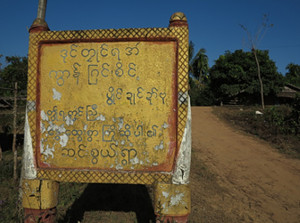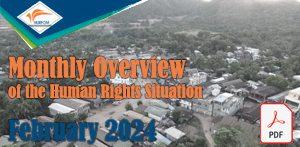In Yebyu Township, villagers dream of living and working in peace
February 5, 2016
HURFOM: In the past month HURFOM has reported twice on recent threats of extortion faced by villagers in Yebyu Township, located in northern Tenasserim Division, at the hands of splinter group forces. As residents in Sin Swe and Sein Pon villages look to the future, they dream of living and working in peace. One question, however, remains unanswered: as Burma’s democratic transition continues, how much longer until their dreams will finally become reality?
Splinter group extortionfrom 2004
 Since 2004 Sin Swe and Sein Pon villages have suffered at the hands of various Mon splinter groups, with prominent groups threatening the village named as the Nai Bin, Nai Saung and Nai Lwin groups. For years these groups have regularly extorted money from residents, using threats and coercion to pressure villagers into meeting their demands.
Since 2004 Sin Swe and Sein Pon villages have suffered at the hands of various Mon splinter groups, with prominent groups threatening the village named as the Nai Bin, Nai Saung and Nai Lwin groups. For years these groups have regularly extorted money from residents, using threats and coercion to pressure villagers into meeting their demands.
According to locals, splinter group activity in Yebyu Township remains just as rampant today as in the days ofmilitary government, despite increased Tatmadaw militarization in Yebyu Township during President Thein Sein’s term. For two decades Mon splinter groups have appeared free to extort money from villagers in northern Tenasserim Division without the threat of legal or military retribution.
Villagers in Sin Swe and Sein Pon villages say that, over the years, security hazards due to splinter group activity have exacerbated livelihood difficulties, and have provoked many residents to leave their villages, migrating to neighbouring countries for work.
Today, the most active group locally is known as the Nai Mon Chan group. According to a local expert, it is comprised of seven or eight members and is led by a Mon militant named Nai Mon Chan. Reportedly, Nai Mon Chan’s group are known for their high demands, but they have not yet killed or physically harmed any victims.
“They came in uniform, with guns”: Extortion in Sin Swe, December 2015
In late December last year, Nai Mon Chan’s group kidnapped local residents in Sin Swe village and demanded a vast amount of money in exchange for their release.
An eyewitness detailed, “Nai Mon Chan’s group came to the village at around 10 p.m. and began extorting money […] There were seven of them. Mon Chan was the only one who was old, the other [splinter group] members were young. They came in uniform, with guns, including two 40 millimeters, an M16 and an AK.”
“I think they threaten people when they demand money because they want people to feel under pressure to give them money quickly,” he continued, “Mon Chan threatened the villagers that if anything happens to his members he will cause trouble for the whole village.”
According to residents, in the December incident Nai Mon Chan’s group made off with 1.4 million Kyat, 2 Kyatha of gold, and 10 hostages. The hostages were freed when the group reached Yay Ngan, by which point they had reportedly extorted another 300,000 Kyat from nearby Sein Pon village.
New year, new threats
Since then, residents say that threats from Nai Mon Chan’s group have continued to escalate. In January 2016 Nai Mon Chan’s group made several phone calls to Sin Swe village, demanding a further 6 million Kyat. After negotiations with a prominent monk, the demand was reduced to 3 million.
According to a villager who wishes to remain anonymous, locals have been given 15 days to voluntarily pay up to Nai Mon Chan’s demands. Reportedly, Nai Mon Chan has announced that if the villagers fail to deliver the money, his group will visit in person to forcibly seize it.
However, the latest threats from Nai Mon Chan have come at a bad time for farmers, following a plunge in rubber prices that has crippled one of the major forms of trade in Yebyu Township.
As threats from Nai Mon Chan’s group continue to abound, Sin Swe villagers have yet to pay up the 3 million Kyat demanded of them, leaving them in a vulnerable position.
Residents say that they just want to live and work in peace, protected by the the law.
Nai Win, a 35-year-old from Sein Pon village, explained, “The region is not safe. The price of rubber is dropping. If we work on our rubber plantations we don’t make any profit. At the same time, the splinter groups are extorting our money. If we can’t pay them, then we can’t travel outside our village [due to security risks]. We are in trouble. We need help from the relevant authorities […] We would like to report [our case] to the government. But if we report it openly we are worried about our safety.”
He concluded, asking the question, “What do other areas do to be safe? When will we live and work peacefully like them?”
Comments
Got something to say?
You must be logged in to post a comment.

















































